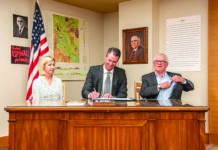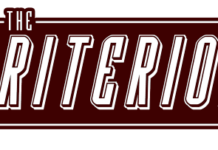Around 12,190 veterans call Mesa County home, according to the U.S. Census Bureau, meaning that almost one out of every ten residents has served in the military (9.8%). A team of employees at Colorado Mesa University (CMU)–many of them veterans themselves–have been making strides to accomodate veterans seeking a degree.
According to the Veteran Services Department, they pride themselves on their hands on approach.. This department has many fresh faces, from the Veteran’s Benefits and Services Coordinator John Peresta, to the Veteran’s Benefits Specialist Alana KarpThis is an incredibly important aspect of the CMU community as it creates a fluid path to success for veterans hoping to get an education.
“One of [my] biggest responsibilities is getting people certified for their benefits. [In other words, I work] with the different chapters the students are in, whether they are dependents, veterans, or in various other chapters, we are responsible for making sure that they are in the system and certified.” Peresta said.
Veteran Affairs (VA) Chapters essentially used by the VA to describe different levels of impact that can qualify veterans or their dependents for educational and workforce benefits. For example, Chapter 30 applies to veterans who have done at least two years of active service, which this qualifies them for monthly payments toward their education.
If this is confusing, that might be because it is; though, this is exactly what the Veterans Services Office is for. Peresta and Karp are specialists in figuring out what benefits incoming CMU veterans can qualify for depending on their chapter in the VA.
“[These benefits] include tuition, and what the VA pays [depends] on your chapter–a dependent, for example, [is] Chapter 35. They get tuition paid for by the VA, but not housing,” Karp said. “[Those in] Chapter 33, which are veterans, get a housing stipend. As long as you’re a full-time [student] it’s about 1600 dollars a month.”
Additionally, when veterans are accepted into CMU, they can set up an advising appointment with Veteran Services, where all class details are laid out in a convenient and smooth way to accommodate the transition from military to collegiate life.
As for tutoring, Karp and Peresta have been seeking to reinvigorate the tutoring programs for veterans. Currently, veterans have access to the Tutorial Learning Center (TLC), but Karp hopes to create an even more relatable experience for CMU’s veterans.,
“A few weeks ago we shot out an email to all the veterans to see if any of them would be interested in tutoring other veterans–they might feel more comfortable having a tutor that’s close to their age,” Karp said.
Karp and Peresta both served in the military and are excited to pay forward the gift of education to other veterans through their new roles within CMU’s administration. Regardless of its current presence, there is a lot of room to grow the veteran’s program at CMU.
“[We want to] try to stay up with the traditions of military holidays and branch birthdays,” Karp said. “That way we can celebrate with the veterans and dependents so they can kind of reminisce on the old times.”
Peresta also pointed out the Student Veterans Association (SVA) that meets in the lounge in Houston Hall. The SVA establishes a sense of community, and plans out events, such as the Armed Service Ball and Veteran’s Day festivities. The lounge is also an area for like-minded vets to have a quiet space to do homework and interact.
From advising appointments with Karp and Peresta, to SVA gatherings, it is fairly simple to get started on an educational journey as a veteran at CMU. In fact, Karp takes pride in the unique approach Mavs take to ensure success in their veterans.
“[Few other colleges are] hands-on. You enroll, say you’re a veteran and they take the whole process away and do it for you. I like the hands-on approach–it makes a little bit more work for the students to do, but it is also very efficient, and makes sure the student is able to talk to others and meet others at school,” Karp said.
It is also important to know advisors and the people who will have your back throughout the course of the college experience, a mistake many students make in the whirlwind of information that comes with being in a new environment.
Working away quietly in the office across the hall was another student veteran and employee, Nick Williams. Williams voiced his appreciation for being able to teach veterans some of the many things that are missed while in service. Williams added that the department has aided countless veterans, and would have been incredibly convenient for him when he was enduring this process a few years ago.
“It’s nice to be able to help other veterans out. [In the military,] they get a small resume class, are shown how to apply for benefits, and that’s it. A lot of veteran students don’t know what they are doing–don’t know what they are entitled to. We have one website right on MavZone that can outline everything that is available to them,” Williams said.
Karp, Peresta, and Williams will continue the significant task of paying forward the education they once strived for after leaving the armed forces by expediting the process in any way possible. These developments from our new team in the Veterans Services Department are quickly turning CMU’s program into one of the most progressive ones to be found in Colorado.




